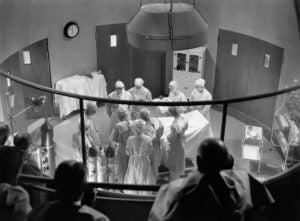How to Train Thousands of Surgeons at the Same Time in Virtual Reality

Share
Recently, I wrote about how the future of surgery is going to be robotic, data-driven and artificially intelligent.
Although it’s approaching fast, that future is still in the works. In the meantime, there is a real need to train surgeons in a more scalable way, according to Dr. Shafi Ahmed, a surgeon at the Royal London and St. Bartholomew's hospitals and cofounder of Medical Realities, a company developing a new virtual reality platform for surgical training.

An operating theater.
Hundreds of years ago, training happened in an “operating theater,” where many would-be surgeons peered over each other’s shoulders to try to get a glimpse of the action and learn as best they could. The reality is, this method of training still hasn’t changed much to this day.
At the same time, two thirds of the global population still doesn’t have access to safe and affordable surgery.
According to the Lancet commission on global surgery, the surgical workforce would have to double to meet the needs of basic surgical care for the developing world by 2030.
Dr. Ahmed is working to solve this problem. He imagines being able to train thousands of surgeons simultaneously in virtual reality.
Speaking at this year’s Exponential Medicine conference, Ahmed painted a vivid picture of the need for a scalable surgical education.
“Imagine that you're a surgical trainee in Tanzania. You're restrained by geography, you're in a rural setting, but you want some training. You want to improve the standards of your health care system, as every doctor does… Imagine you're a surgeon, maybe an attending in Bangladesh, a population of 150 million with a very poor infrastructure of training and teaching….Imagine you're a school kid in a inner city area, a poor district. But then you want to be a surgeon, you want to train to be a medic, you want to access information. You'd like to know what it's like and immerse yourself.”
Ahmed believes that education is a basic, fundamental right for everyone and that with virtual reality, he can train surgeons across the world in a way that has not been possible before today.
Dr. Ahmed has already made some steps towards this reality. In May of 2014, he streamed a training session through Google Glass, reaching 14,000 surgeons across the world.
Be Part of the Future
Sign up to receive top stories about groundbreaking technologies and visionary thinkers from SingularityHub.


In April of 2016, he live-streamed a cancer surgery in virtual reality. The procedure, a low-risk removal of a colon tumor in a man in his 70s, was filmed in 360 video and streamed live across the world. The high-def 4K camera captured the doctors’ every movement, and those watching could see everything that was happening in immersive detail.
[Note: This video shows a live surgery. Content may be too graphic for some viewers]
So today, we already have the technology to allow medical students to stand in the shoes of an experienced surgeon. What’s next for surgical education?
“In time, we [will be] wearing gloves or body suits [so] we can touch and feel things in the virtual world. Then ultimately, imagine being a virtual surgeon, where you pop into a virtual theater [with] virtual patient [and] virtual instruments and do a virtual operation,” says Ahmed.
Want to keep up with coverage from Exponential Medicine? Get the latest insights here.
Image credit: Shutterstock
Sveta writes about the intersection of biology and technology (and occasionally other things). She also enjoys long walks on the beach, being underwater and climbing rocks. You can follow her @svm118.
Related Articles

AI Companies Are Betting Billions on AI Scaling Laws. Will Their Wager Pay Off?

Super Precise 3D Printer Uses a Mosquito’s Needle-Like Mouth as a Nozzle

Is the AI Bubble About to Burst? What to Watch for as the Markets Wobble
What we’re reading